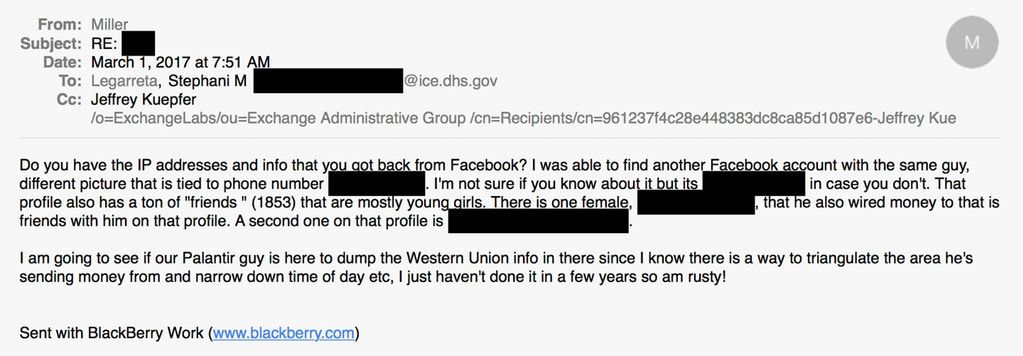
Public records requests have shown that Immigration and Customs Enforcement (ICE) use Facebook’s logs, merged with logs from cellular carriers and analyzed by software from Palantir (Peter Thiel’s police-state arms-dealer) to track and deport immigrants.
Thiel also sits on Facebook’s Board of Directors.
Theintercept.com reports: Palantir is a controversial data analytics firm co-founded by billionaire investor Peter Thiel. The company, which does business with the military and major intelligence agencies, has contracted with ICE since 2014. As journalist Spencer Woodman reported last year, the company developed a special system for ICE to access a vast “ecosystem” of data to facilitate immigration officials in both discovering targets and then creating and administering cases against them.

BYPASS THE CENSORS
Sign up to get unfiltered news delivered straight to your inbox.
You can unsubscribe any time. By subscribing you agree to our Terms of Use

But there is little public disclosure of how ICE uses the Palantir platform to track individuals. The emails obtained by The Intercept show that private Facebook information is yet another data point for agents in pursuit of a suspect.
“I have not heard of HSI going and getting private information from Facebook. What we’ve been seeing is when they use someone’s Facebook page and print what they’ve been posting to use as evidence to argue that person is a gang member,” said Rachel K. Prandini, staff attorney with the Immigrant Legal Resource Center.
“Photos with friends ICE thinks are gang members, doing hand signs that ICE alleges are gang signs, or wearing clothes that ICE believes indicate gang membership are being pulled from Facebook and submitted as evidence in immigration court proceedings,” Prandini added.
Matthew Bourke, a spokesperson for ICE, emailed The Intercept to say the agency would not “comment on investigative techniques or tactics other than to say that during the course of a criminal investigation, we have the ability to seek subpoenas and court orders to legally compel a company to provide information that may assist in case completion and subsequent prosecution.”
“Court orders are an established procedure that is consistent with all other federal law enforcement agencies. Additionally, investigators can use open-source information that is readily available on various social-media platforms during the course of an investigation,” Bourke added.
THE STORED COMMUNICATIONS ACT provides broad powers for law enforcement to request information from communication service providers, including Facebook. The law delineates a variety of types of data that can be requested, much of it without a court order.
Facebook publishes a semiannual transparency report detailing the number of government requests for user data. The report does not break down which law enforcement agencies are making the requests for data, so it is unclear how many of the requests came from ICE.
The report reveals that from January 2017 through June 2017, Facebook received 32,716 requests for data from 52,280 users. Facebook notes in its report that it complied with 85 percent of the requests and “approximately 57% of legal process we received from authorities in the U.S. was accompanied by a non-disclosure order legally prohibiting us from notifying the affected users.”
“Occasionally companies will push back, but that’s relatively rare,” says Nathan Wessler, staff attorney with the American Civil Liberties Union’s Speech, Privacy, and Technology Project. “From time to time, companies will push back if they receive what they perceive to be a grossly over-broad request, like a true dragnet request, or if there’s a request for example to unmask the identity of someone who is engaging in First Amendment-protected speech online anonymously. But they — for the vast majority of the requests — they comply.”
“For these subpoenas, it’s trivially easy for ICE or any other law enforcement agencies to issue,” explained Wessler. “They don’t require the involvement of a judge ahead of time. It’s really just a piece of paper that they’ve prepared ahead of time, a form, and they fill in a couple of pieces of information about what they’re looking for and they self-certify what they’re looking for is relevant to an ongoing investigation.”
Facebook is facing increasing demands about how it manages user data. Recent reports from a whistleblower have refocused attention on the Silicon Valley company for allowing Cambridge Analytica, a campaign consulting firm that served groups supporting Trump’s presidential campaign, access to user data.
Though Facebook and its founder Mark Zuckerberg have provided political support for immigration reform efforts in the past, the company has received relatively little scrutiny for its role in ICE’s deportation machine. Last year, ICE agents requested private Facebook data to obtain a cellphone number for an unauthorized immigrant in Detroit who they were pursuing. That number was then tracked through a cell site simulator, a powerful surveillance tool used to vacuum cellphone calls and user location data.
The agency appears to continue its search for greater technology tools to track and apprehend unauthorized immigrants. Last month, ICE released a request for proposal for a private contractor to provide tools to track target employment data, credit checks, vehicle accident reports, pay day loans, and other data sources. The Department of Homeland Security, meanwhile, has made aggressive new efforts to obtain social media data from those entering and exiting the country.
Wessler noted that the use of Facebook data combined with Palantir shows the agency is expanding its reach.
“It speaks to the importance of companies like Palantir to have tremendous ability to amass a great deal of information about people, Wessler said. “Just because a federal agency can pay for a contract to provide a service doesn’t mean it is a good idea when it’s enabling a massive deportation apparatus without appropriate checks and balances.”


